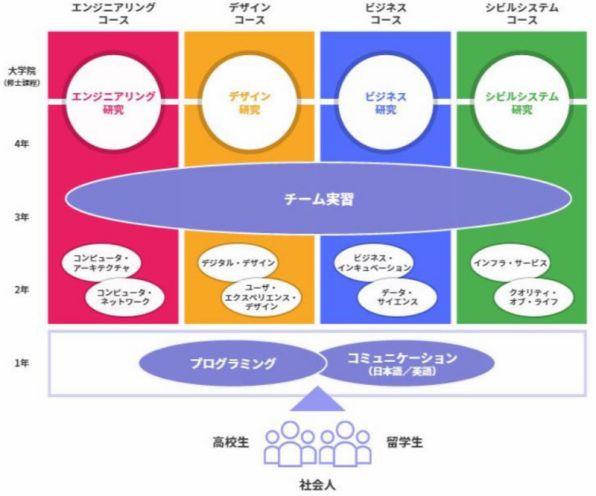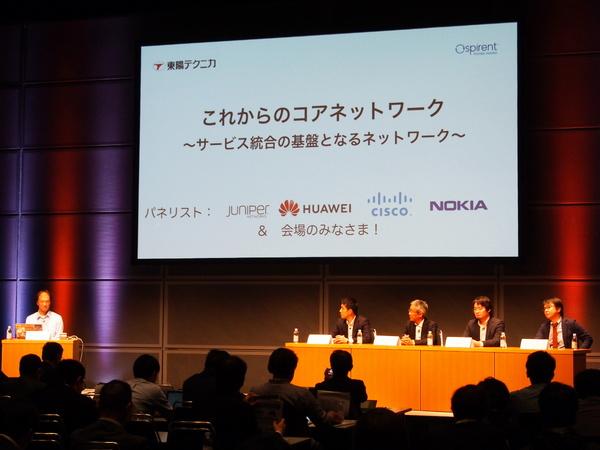Programming + First year university...
17
02
Programming + First year university should be devoted to programming no matter what you specialize in
Nowadays, things around us are connected to computers in various ways, and "ubiquitous" has become a matter of course. Professor Ken Sakamura of the University of Tokyo is one of Japan's leading computer architects who advocated the TRON project, which can be said to have been ahead of its time, and has had an impact on the times.
Currently, he is a professor who is active not only in the projects he leads, but also in industry, academia, and government. He says that he will work on education that goes beyond the conventional wisdom of universities and is suitable for a computer-based society. Rather than ``searching for a new education,'' Ken Sakamura seemed to suggest that ``I already have the answer.''
In today's era, not only individual "human resources", but also "teams" that transcend fields demonstrate many times the performance. We also want to instill a new culture of people and work that is clearly lacking in Japan, emphasizing new foundations such as programming that support it. I felt that I was able to hear a logical talk that could be said to be a sample of computational thinking.
We need a "new education" to do "new things" and an environment for that
――Will you create a new faculty?
Sakamura: A little while ago, Toyo University asked us if we could create a new computer-based faculty.
―― A new faculty will be created from scratch.
Sakamura: So, from April next year, we will open a faculty with a completely new concept. "INIAD" (Information Networking for Innovation And Design) is branded as "INIAD". Officially called the Faculty of Information Networking, it has a capacity of 400 students per academic year. It's not small either.
―― When I look at the pamphlet, it says in large letters, "Fusion of literature, art and science."
Sakamura: Now programming and computers affect everything in the world. It's not a department that trains specialized programmers or builds computers. There is an "engineering" course that does that, but more specifically, there are four courses: "design," "business," and "civil engineering."
We will develop human resources who can think based on computers, such as "business" that builds and manages business models, and "civil system" that considers applications to society and life. The point is to provide education for doing “new things” while collaborating on that common base. For example, take a look at this curriculum.
――Oh! There is a solid programming in the first year.
Sakamura: Usually, when you enter a university, you will take "general education subjects" in the liberal arts course. so-called “liberal arts”. This is natural, and it is also important to study things that are not directly related to your specialty at university. But in my opinion, you don't have to study liberal arts right after entering university. If you're in college for four years, you can study any part of those four years according to your interests and convenience. In the first year, all students should take computer science and acquire programming skills.
The course content for the first year is written only as programming and communication. From the website of Toyo University's Faculty of Information Networking, which will start in April next year.
── It's a bold statement, but I understand.
Sakamura: Even if you are told that ``first of all, you need to be educated'' when you enter university, you don't know what to do if you don't have anything to base yourself on. It's strange that you end up choosing something that's easy to get credits for, and then it becomes a popular lecture. Instead, no matter what you plan to major in in the future, this faculty will have you do programming in the first year.
The first year is programming, so you don't have to decide which one to do when you enter, and you can enter here even if you take a liberal arts exam. Then you can study science. Of course, there are people who enter the university after taking a science exam, but when I tried it, I found that even science students were suitable for design. Or something like that.
―― I think there are areas where computer skills can be used more effectively in literary genres.
Sakamura: The current situation where students decide between the humanities and sciences in the first or second year of high school is really not good. Even though I don't really know what I want to study and whether the direction of the subject is suitable, I decide based on the grades and deviation values of each subject. In fact, it is not because the educational content of the university is good, but because the grades are good. Universities are the best places to go because you want to study, not because you want qualifications.
―― Regarding programming, there is a former NASA engineer who created a programming game for children called "CODE MASTER" in the United States. He says that it's not good to do programming normally after entering university. I'm telling you to do one at an early stage.
Sakamura: Unfortunately, in the case of Japan, this is not the case.
-- So I'll do it in my first year of college.
Sakamura: Have them do the programming. Then, when you enter your second year, you will be able to see your own aspirations. So, in the third year, in addition to specialized studies, we will do "team training" as part of the "Faculty of Information Networking for Innovation and Design."
―― By crossing courses such as engineering, business, and civil engineering, you're doing practical training in the "integration of literature, art, and science."
Sakamura: Nowadays, even in a company, there is no one person who does everything by themselves. For example, if I were to get a job as an engineer at an electronics manufacturer, of course I would have to create internal circuits and do programming, but the product also needs the outside, so I have to work with people in industrial design. UI (user interface) design is also important. Once the product is completed, it is necessary to collaborate with people who are active in sales and business. Since products will be used in society and in part of our daily lives, it would be nice to have collaborations that focus on urban engineering. I'm trying to do practical training as an education based on the premise of such collaborative work.
―― Society has a nested structure, with cities, companies, houses, and individuals. It's starting to connect with information.
Sakamura: That's right. If you look closely at each academic field, business used to be a liberal arts. Of course, there are still business administration and accounting studies, but from now on, it will be impossible to get a job with just a certification like a certified public accountant. It is necessary to use big data for statistical analysis and use it for marketing, or to explore market trends by making full use of deep learning. The liberal arts are also inseparable from computer science.
―― Finance is symbolic, isn't it? Since money is originally the "informationization" of wealth, it is rapidly advancing.
Sakamura: In finance, "Fintech" *1 is attracting a lot of attention, isn't it? Urban engineering has already changed, and in the past, when building a city, the first thing to do was how to lay infrastructure, how to lay water supply, and how to run roads. Currently, the emphasis is on how to create a community. The emphasis is shifting from hardware to software, such as what to do with Internet services.
―― It's really nice for students to practice in a team that transcends their specialties. It may also be an experience similar to “entrepreneurship”. This is because there are almost no institutions in Japan that nurture entrepreneurs like there are in the United States. Let me ask you a slightly mean question, why haven't you been able to do it until now?
Sakamura: It takes a lot of money to do this. Implementing a completely new curriculum requires new environments, equipment, and staff. This time, we are working on starting with the acquisition of land and building a new building.
At the "Fragments of Knowledge" held from October 11 to 28, 2016 at the University of Tokyo Interfaculty Initiative in Information Studies, Daiwa Ubiquitous Academic Research Hall, planned by Mr. Sakamura.
Without "encounters" and "collaboration", work will not go well
―― Smartphones are at their peak these days, aren't they? So, about two and a half years ago, I planned and implemented a smartphone app course with a total of 136 frames x 2 hours. At that time, I did some research beforehand, but there were almost no universities that properly taught the current situation related to smartphones. Of course, there are some teachers who are doing their best. As the world moves toward smartphones, for example, if the UI is bad, it can have such an impact that the whole corporate activity that is the gateway to it will be ruined.

Sakamura: Oh yeah. Conventional informatics faculties, science faculties, and engineering faculties are useless in such areas. The more I research, the more I realize that it is difficult for Japanese universities to change. This does not mean that Japanese people are not excellent, or that universities and companies are completely useless, but that it is difficult to change the conservative nature of old organizations.
――Why is that?
Sakamura: It is said that it is difficult to grow venture businesses in Japan. I think this is because Japanese people are originally an agricultural race and tend to be fixed and unfluid. I have a strong idea of protecting what I have created. So what are the big differences between Silicon Valley and Tokyo? "In Japan, of course, there are many people who come up with new ideas." After that, I was able to raise a fair amount of money. Then, what is lacking is that "human resources" are not flowing. In Silicon Valley, human resources move on a project-by-project basis, don't they? If you say, "I'm going to do such an interesting project next time," someone will come. Quite a lot of people gather. That's what makes it different from Japan.
――In the case of the United States, do people come together after quitting the company?
Sakamura: Of course, rather than quitting, you don't feel like you're working for a company in the first place, but you feel like you're participating in a project. It is more important to say "I was involved in that project" rather than "Which company did you work for?" To put it bluntly, if it's a 3-year project, the idea is that when the 3-year project is over, I'll start a more exciting project with the next company. It's the same for the company, and for me personally, it's natural to move on to the next project after finishing one project. In Japan, there is a strong concept of lifetime employment, which means that once you work, you work until the end.
But, even in Japan, there are ways of working on a project-by-project basis. In the food and beverage industry and the beauty industry, Mr. Itamae and the hairdresser will move, right? In the construction industry as well, architectural offices and construction companies work on a project-by-project basis.
―― Japan also works on a project-by-project basis, doesn't it? So it's not impossible at all.
Sakamura: I want to spread the movement and mobilize human resources. I especially want to work in the IT industry in Japan. I would like them to think more about what they are doing, how to advance their career, and how to decide the next game in their career.
So, in the United States, even if you start a business, it is good to create a team of different specialists, such as an engineer for the content of the product, a designer for the package, and a businessman for the sale. . People over there often have parties for the purpose of meeting people.
―― It seems that someone who is suitable for starting a business, someone who is suitable for growing from there, or a CFO (Chief Financial Officer) can do this. In Japan, there are few systems for such human resources, and there is no horizontal connection.
Sakamura: I think so. That's why Japan becomes vulnerable to "systems".
―― I can't do a job that dynamically combines various elements.
Sakamura Yes. The larger the scale of the system, the more likely it is that the whole system will not run smoothly. For example, it is extremely difficult to do a big project like NASA successfully. A big project cannot be accomplished without the cooperation of many experts in various fields. This is what we call "collaboration".
Information science certainly has the idea that theory should be done with algorithms and mathematics. However, it is not possible for a person who has mastered the theory alone to make it to the final product. I would like to forcibly change the awareness of that area through education. I hope that the idea that work will not go well without "encounters" and "collaboration" will become commonplace, and as an educational institution, I would like to provide opportunities for encounters and teach the art of collaboration.
――What exactly are you going to do in the team training?
Sakamura: Given a task or theme, people from the four courses are mixed to form a team and practice in ideathons and hackathons. My ideal is 50 male students, 50 female students, 50 Japanese students, 50 international students, 50 new high school graduates, 50 working people. Shin. In particular, I want to include many members of society.
――Do you have an image of making the faculty itself like a mini-society while simulating it?
Sakamura: Universities in Japan are more of a "waterfall type"*2, but I want to be an "agile type"*3, an agile university. (smile).
――It's true that the University of Tokyo can't do that. You may be sitting too heavily on your back.
Sakamura: I think that the University of Tokyo is fine as it is now, and I am opposed to following suit, saying, "Other universities are conducting AO entrance examinations, so the University of Tokyo will follow suit." Whether it's the University of Tokyo or a company, Japan's old organizations have established establishments, and it's not like everything has stagnated. Speaking of diversity, it would be nice to have a university like the University of Tokyo. The system in Japan is not so bad that it should be demolished and rebuilt.
Programming is one theme, and I want to give you 10 hours, 20 hours, or 30 hours
Sakamura: As a new form of education, one form I'm going to do it from next spring. So, in this department, you can also go to graduate school at the same time. We also welcome members of the public. We are also considering it as a re-education institution for those who want to learn programming from now on and want to study again. The application period for the graduate school entrance examination is from January 6 to January 12 next year, so please prepare now.
――Will it be possible for a working adult with no programming experience to enter graduate school?
Sakamura: I'd like you to start programming from the undergraduate level, but the current university allows you to shorten the course or transfer, so it's not about repeating the four years.
―― Nowadays, new technologies are coming out more and more, so it seems that big companies will be interested. Big companies say innovation, innovation, but they should understand the reason why it is idle.
Sakamura: In programming classes, I would like to give students who want to understand properly even if it takes time to spend 10 hours, 20 hours, or 30 hours on one theme. I won't drop it because I can't understand it in an hour. Instead, students who are unmotivated are no good. People who are unmotivated cannot work together. You can't form a team with someone who says, "I don't know anything" or "I can't do anything." Teams are like that.
――What is a team? is a big theme. I don't think Mr. Sakamura reads manga, but there is a very popular work called "ONE PIECE" serialized in "Weekly Shonen Jump". It's a story about pirates, but each one has a role, a character, and continues the adventure with friends. It's popular because the feeling of wanting that kind of thing is essential now. In the United States, in response to such changes, MOOCs have emerged, and mechanisms such as Y Combinator to train entrepreneurs have emerged.
Sakamura: I would like to make full use of MOOCs. On top of that, the university is a place based on discussion and helping each other. In this world, there are people who are said to be "geniuses", but no human being is truly superior in all directions. Superman doesn't really exist. Even at the University of Tokyo, you can study, but you can't do sports, but sports are one academic field. If you let him do sports, he will win the gold medal at the Olympics. By thinking on the premise of connecting and cooperating, you can be many times more active than just one person. Especially in the world of programming, as you know, it's becoming that way.
―― In this interview, "Programming +", I would like to recapture the value and appeal of programming. I also have articles about learning Ruby while making Ruby.
Sakamura: Interpreters are easy to create, so it would be nice to learn LISP while creating it, such as a functional language. In the past, it was common to write a LISP interpreter in LISP*4.
── However, in today's world of computers, there are fewer and fewer people doing things based on the principles and structures of languages.
Sakamura: So there's a gap between the content of the hardware you're actually using and the level of your theoretical understanding. As the integration rate of computers increases, the number of things that can be packed into them also increases, so computers are becoming more and more complex. On the other hand, devices that can be programmed, such as FPGA*5, are appearing.
―― On the other hand, single-board microcomputers such as Arduino*6 are also appearing.
Sakamura: When thinking about programming, it is becoming important to think about how to do things in the current environment. Also, programming is a broad term. In the world of embedded systems that I have worked in, once a program is created, it will be used 1,000,000, 10,000,000,000,000,000,000,000,000,000 times. When you write something like that, it's still a matter of reducing memory consumption even a little. The power consumption will be different if it is rotated 1 billion times. On the other hand, there are times when you want to do web-based programming now. If you want to process information on the net a little and output it, the number of executions may be one.
―― In fact, the world of programming is finally being used in various situations, so I think it is necessary for education to keep pace with that.
Sakamura: There is now a way to do programming. Based on this idea, we are creating a new university department, INIAD (https://www.iniad.org), which will start next April.
Ken SakamuraProfessor, Interfaculty Initiative in Information Studies, University of Tokyo, Doctor of Engineering
Born in 1951 in Tokyo. Majored in computer architecture (cyber architecture). As the leader of the TRON project since 1984, he has built a computer system based on a completely new concept and has attracted the attention of the world. Today, TRON is the most widely used in mobile phones, digital cameras, facsimiles, car engine control, etc., and has become an important embedded OS that realizes a ubiquitous (everywhere) computing environment. In addition, we are developing a wide range of designs such as electrical appliances, furniture, houses, buildings, cities, museums using computers.
[Related Sites]
Notes
- [Fintech] A coined word (FinTech) from Finance + Technology. In contrast to financial engineering, which has traditionally been centered on the financial industry, Fintech is the innovation of financial technology by venture companies and others making full use of information technology. New investment tools, payment services and security technologies are emerging. ↩
- [Waterfall type] A development method used in large-scale engineering projects. It is so called because the process of planning, building, and testing resembles a waterfall. ↩
- [Agile type] In contrast to the waterfall type development that emphasizes planning, in the agile type development, results can be confirmed early from the intermediate stage, and specifications can be changed quickly and flexibly. go. Agile means "quick". ↩
- [LISP] A functional language devised in 1958 by John McCarthy, who is famous for his artificial intelligence research at MIT. The name LISP means "list processor", and the source code itself consists of lists. ↩
- [FPGA] A type of device that allows users to change and configure the combination and connection of logic circuits. ↩
- [Arduino] An oven sauce microcomputer developed in Italy in 2005. It is very popular because it allows you to build an environment to run programs without advanced expertise. ↩








